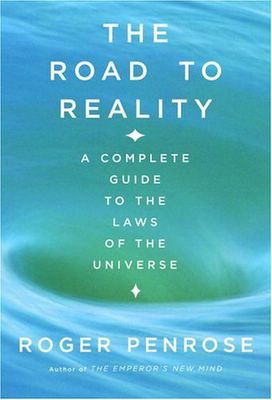 I picked up Roger Penrose's Road to Reality a while back. I can't quite remember where I read about this book first. Probably the New York Times. I don't think I actually read the review because I would have been keenly aware of something that struck me this weekend. I'm actually reading something else right now but needed a break and cracked open Penrose's book. Penrose's name has come up in my readings about Godel. He's also worked with Hawking on black hole theory. He's a sharp guy so I just picked up the book. I hadn't looked inside until now.
I picked up Roger Penrose's Road to Reality a while back. I can't quite remember where I read about this book first. Probably the New York Times. I don't think I actually read the review because I would have been keenly aware of something that struck me this weekend. I'm actually reading something else right now but needed a break and cracked open Penrose's book. Penrose's name has come up in my readings about Godel. He's also worked with Hawking on black hole theory. He's a sharp guy so I just picked up the book. I hadn't looked inside until now.The first thing I noticed is the book is immense. Over 1,000 pages long. This is unusual for what I deemed a popular science book. But not nearly as weird as what is in those 1,000 pages. I first hit the prologue and read that. The first thing he talks about is how he had constant advice not to put math on any of the pages in this book. He defends his right to use math. "Okay", I thought, "just how much math did he actually put into this book?" So I move forward to the table of contents. It isn't until about page 2-300 that it seems he takes on anything to do with physics. He even has a subchapter on Fourier decomposition.
Interested I flip through some of those first hundred pages. My God. This book is loaded with math. He's got integrals, differentials, vector & tensor mathematics, etc. I've never seen a 'popular' book like this before. I went back and checked amazon.com's ranking. It's #98. This is really unprecedented. I bet there are a lot of people who gave him advice to avoid math who are just shaking their heads. What I do hope is this will embolden a new generation of science books that actually put some math on paper. It's really atrocious when you think about it, that a popular science book has to avoid math to be 'popular'.
While I have taken formal classes for what's on page here I still think this will be major undertaking to read. Most likely because it's been a while since I took any of those courses. But I think I'll read this with a little more forethought than I usually read these books. This could easily take half a year to read. But I do think there is some merit in giving it that kind of time. I can assure you of one thing though. I will not be blogging all the main concepts from this book. Not unless someone can tell me how to do html for complex mathematical equations.

No comments:
Post a Comment